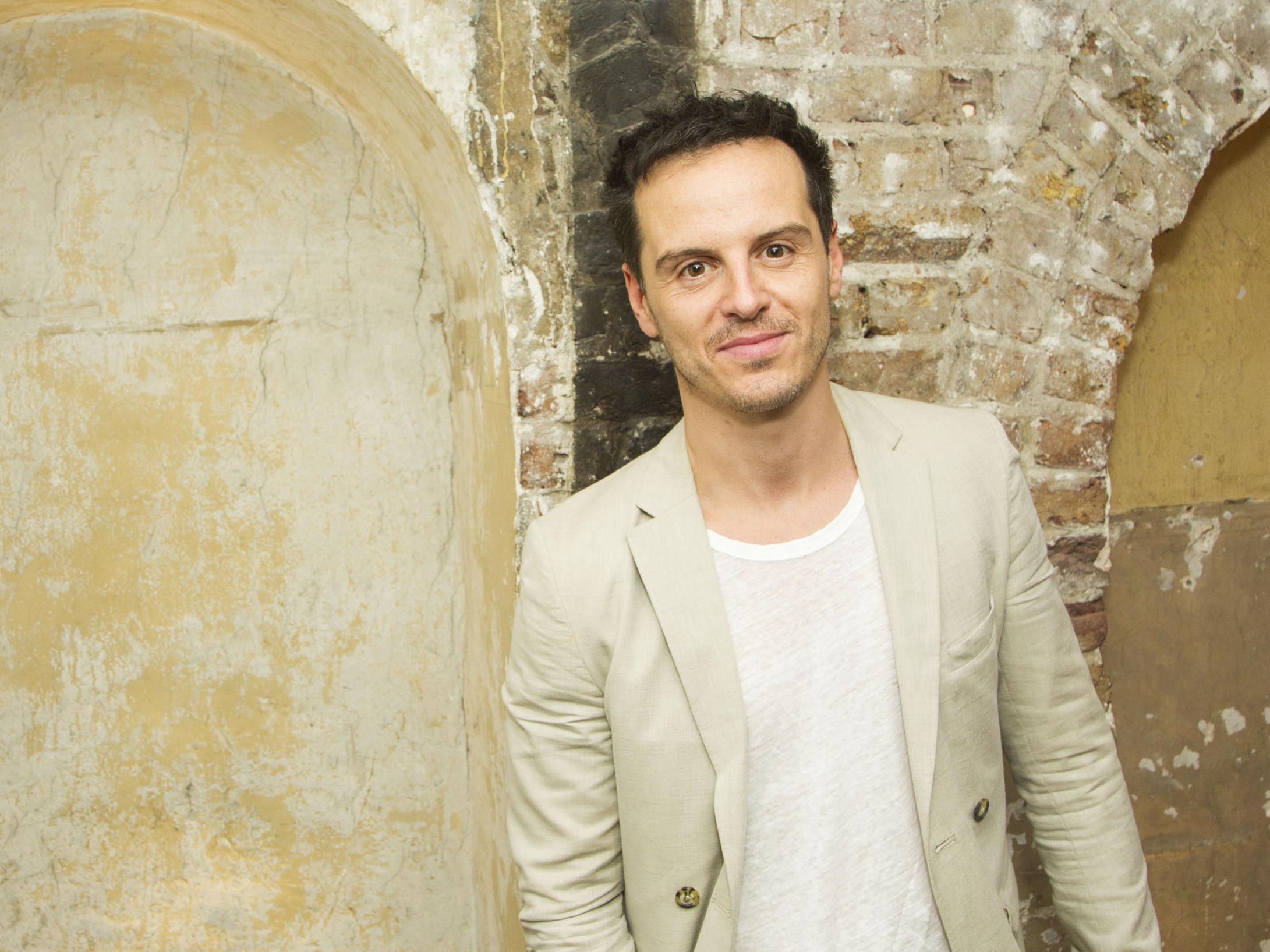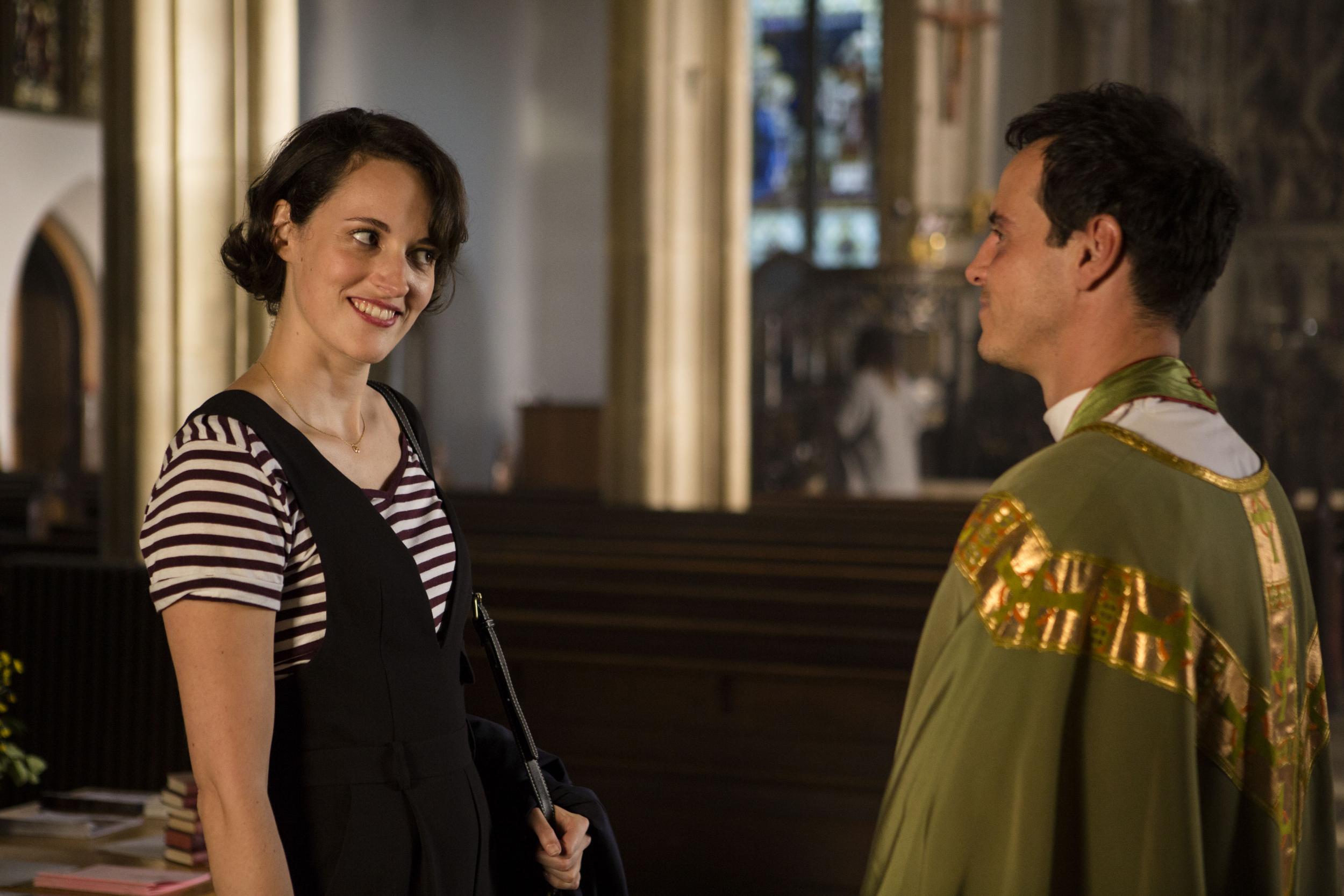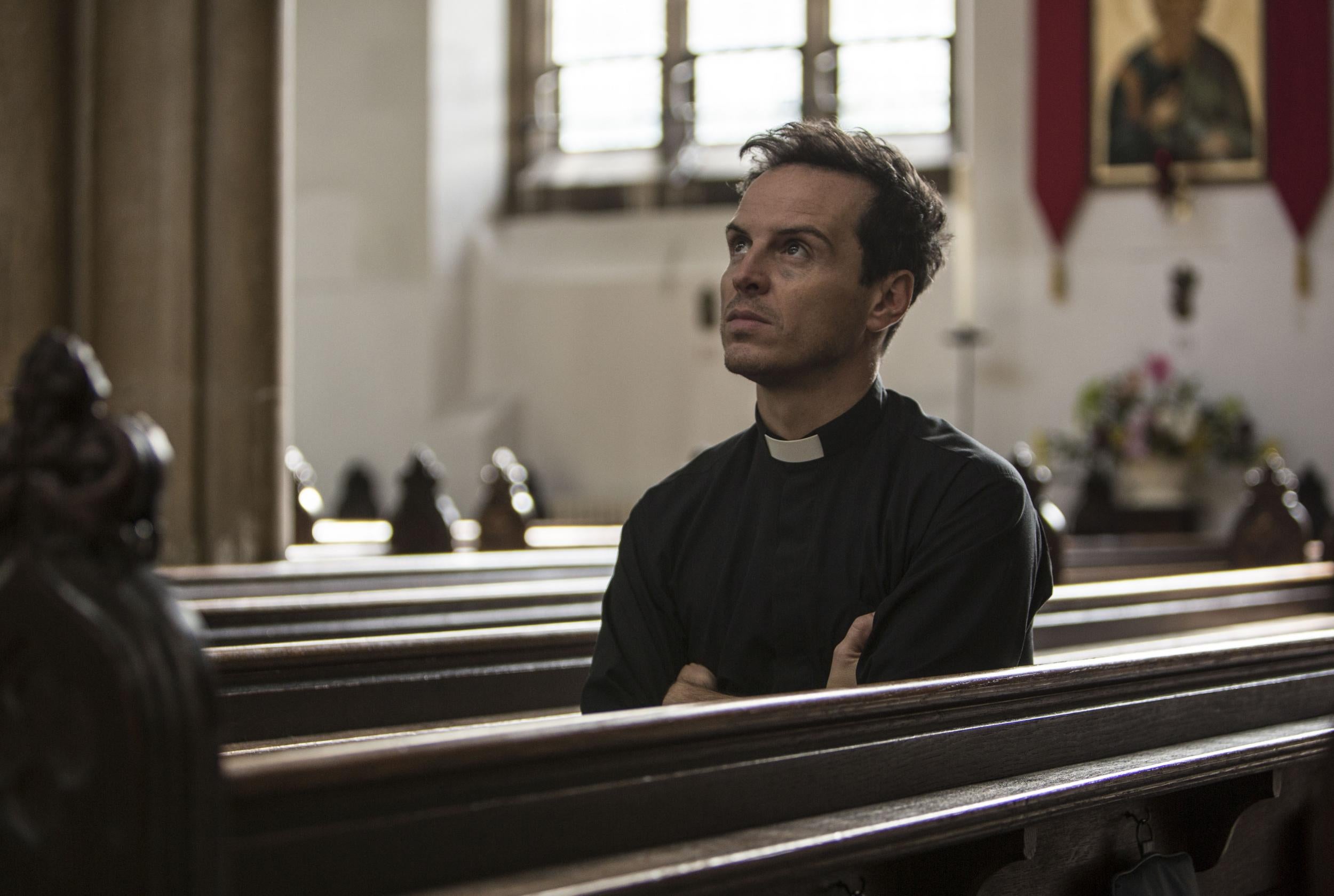Andrew Scott interview: ‘The damage the Catholic church did to me is still within me’
Ahead of Fleabag series two, Alexandra Pollard speaks to Andrew Scott about working with Phoebe Waller-Bridge, his religious upbringing and why he wants to see Olivia Colman as the first female Bond


Your support helps us to tell the story
This election is still a dead heat, according to most polls. In a fight with such wafer-thin margins, we need reporters on the ground talking to the people Trump and Harris are courting. Your support allows us to keep sending journalists to the story.
The Independent is trusted by 27 million Americans from across the entire political spectrum every month. Unlike many other quality news outlets, we choose not to lock you out of our reporting and analysis with paywalls. But quality journalism must still be paid for.
Help us keep bring these critical stories to light. Your support makes all the difference.
When he left Ireland two decades ago, Andrew Scott thought he had escaped the world of cassocks and dog collars. He certainly didn’t think he’d ever be donning them himself. So it took him by surprise when Phoebe Waller-Bridge, creator and star of the pitch black BBC comedy Fleabag, asked him to do just that – play a Catholic priest in the show’s second series.
“I was damaged by the Catholic church myself,” says the 42-year-old star of Sherlock and Spectre, clutching a cushion in the green room of London’s BFI Southbank. “But that doesn’t mean it’s without merit for some people. And it doesn’t mean it’s without merit for this character. He’s good at his job, and he sees meaning in it.”
Scott’s priest isn’t exactly a paragon of piety: he is flirty, sweary, and hides G&Ts in the church cupboard. His parents are alcoholics and his brother is a paedophile. “I’m aware of the irony of that,” he says wryly in the new series, which picks up 371 days, 19 hours and 26 minutes after the brilliant first one left off. The first episode takes place over the course of an engagement dinner, but this is Fleabag, so the celebration ends with a miscarriage, two bloody noses and a “well f**k you then” from the priest to Waller-Bridge’s eponymous anti-heroine. But as the series progresses, the pair’s relationship develops into something quite profound.
“It’s not taking an easy swipe at the Catholic church,” says Scott, staring at the mirrored ceiling above us. “Are there faults of the Catholic church that are highlighted by it? Yes. But there are also amazing things about the Catholic church that are brought up later on in the series.”
Growing up in Dublin, Scott attended a Catholic boys’ school, where teachers would spew flippantly homophobic rhetoric, and his classmates would laugh along. It was hardly the ideal place for a shy, insecure gay boy to thrive. “It’s still within me, that damage,” says Scott, who came out publicly in 2013. “But weirdly, forgiveness, which is something that the Catholic church teaches you, is something that I’ve had to employ in relation to that itself, which is kind of strange. But I’m enormously grateful that I, because of the work that I’ve done, have been allowed to emancipate myself from it a little. My particular attitude towards the Catholic church is, you know, depending on the day... It’s taken a long time to find my voice, and to not... because sometimes the rage that you feel...”
Scott finishes about one sentence in every five. The rest either trail off into silence or are swallowed up by the next train of thought. In this case, I suspect the damage is probably too deep and complicated to articulate. Which makes it all the more surprising that he returned to his old school a few years ago. “They had an evening for the alumni who’d gone into the arts,” he says, “and I was interviewed by school kids, 15 [and] 16-year-old boys and their families. We talked about the [abortion] referendum in Ireland, what it means to be gay… Even thinking about it now!” He falls back into a sort of swoon. “In that room, in the school hall, where they said such terrible things, to be able to just be seen… Just the idea that a 16-year-old, who may or may not be gay, can say, ‘There’s that person, and that’s not a big deal, and they’ve been allowed to do something, and their difference hasn’t prevented them from doing that,’ that was actually very cathartic. It really was. I felt proud.”
Does he ever feel aggrieved that he didn’t get to grow up in the Ireland that exists now? “No, I don’t. I absolutely don’t, because the journey has been so extraordinary. I think hardship is a good thing to a certain degree, and I think some of the people in the most pain, who feel a lesser sense of identity, are people who haven’t been through anything at all. Because they’ve sort of coasted along. Where’s the grit,” he says, grinding his hands together, “that makes the pearl, you know?”
Perhaps it’s this very grit that makes Scott such an extraordinary actor. He has, in the words of Phoebe Waller-Bridge, “the charisma of 10 people rolled into one” – and an energy that is indefinable and disorienting. Whether he’s playing a Bond villain (as he did in 2015’s Spectre) or Hamlet in London’s West End, Scott is at once excitable and melancholic, colloquial and cartoonish. To the good guys, he brings a dark, enigmatic edge, to the bad ones – like Moriarty in the BBC drama Sherlock, for which he is perhaps best known – a playful, boyish charm. It is confusing and enthralling.
In person, he’s also fidgety, and gives several enthusiastic variations on every answer. “It’s definitely unusual, and I find it really exciting,” he says of the fact that Fleabag is a show created by a woman, starring a woman, and told firmly through the eyes of its female protagonist. But then he changes his mind a little. “It was exciting not because it was a female voice,” he says, “but because it’s Phoebe’s voice. I say this a lot, but our gender, or our sexuality, isn’t a virtue in itself. It’s just not. It’s just a matter of numbers, it’s just about the amount of times where the boss has been a woman. In my experience, it’s a low number.”

Watch Apple TV+ free for 7 days
New subscribers only. £8.99/mo. after free trial. Plan auto-renews until cancelled

Watch Apple TV+ free for 7 days
New subscribers only. £8.99/mo. after free trial. Plan auto-renews until cancelled
Is working with people who’ve been under-represented something he seeks out? “No, I don’t think it’s something I seek out. I suppose a number of the closest people in my life are women…” He pauses, seemingly on the brink of recanting his first answer. “No, I don’t think it would be right to say I seek that out. I suppose we’re all interested in unique voices. You have to look at what the quality of the product is, because otherwise we’re in very dangerous territory, and that is just box ticking. It really is. If it was a straight, white man with an extraordinary voice, I think that work should be looked at with as much forensic focus as anything else. I think we have to be really discerning.”

The difference, of course, is that if a straight, white man’s work is not extraordinary, it’s never held up as evidence that straight, white men aren’t as capable. “That’s exactly the point,” agrees Scott. “That is exactly the point, because it hasn’t been a level playing field. And you have one chance, and if that didn’t make any money, or people didn’t watch that, ‘Sorry, thank you, next’. That’s the issue. It’s not just, ‘Oh I’m brilliant at that, so I get to do that’, it’s your feeling of being entitled to do that. Entitlement I don’t think is a bad thing, it’s just that we associate it with people who are just posh. Everyone is entitled to everything, that’s what equality means. I am as entitled to this as you. Not more entitled, just as entitled!”
It’s important, says Scott, that everyone feels this way. “Otherwise there could be some little genius who goes, ‘Oh that’s not for me, I’m a working-class black girl, I can’t ever do Shakespeare’. And if you go, ‘No there is, let me show you, it’s on YouTube, there you go,’ and that person turns out to be some great person… the idea that they would go and work in an office when that’s not what they should be doing, I think can be just really damaging to the world.”
How does he feel, then, about the current buzz around inclusion riders – a clause in an actor’s contract that insists upon a certain level of diversity in casting and production staff. “Inclusion riders is so American right?” he says in a valley girl drawl. “We don’t really say ‘riders’ in Ireland and England do we? It’s sort of embarrassing. ‘For my rider…’” He catches himself before that tangent goes any further. “But yeah, absolutely, I think you’ve gotta do that. Yessss, you do. You’ve got to say, ‘What’s that? What’s that?’ You have to be fair, you have to work harder.” Then again, he adds, “I don’t want to be cast because of my sexuality. I don’t want that. I’ve never really thought of myself as a minority. I haven’t found it helpful for me.”
There’s been much talk, lately, about casting a wider net when it comes to who could play James Bond. So far, they’ve all been white men, but the day Scott and I meet, headlines announce that the odds have been slashed for his Fleabag costar, the recent Oscar-winner Olivia Colman, taking the baton. “Noooo, really?” says Scott, falling forwards this time. “Arghhh! I’d love to see Olivia as James Bond! Oh my God. Wow. I can see her rolling over a car with a white tux on.”
As someone who must have met his fair share of Bond fans, how does he think they’d react? “I don’t know,” he says. “Rachel Weisz said something brilliant about the Bond thing, which is like, why can’t there be a new superhero that isn’t reinterpreting what a male has already taken over? And I know what she means. Isn’t it a great challenge for there to be this amazing new female hero? And then have lots of different people play that part. I really want to see that. People have real ownership over James Bond don’t they? I just find it difficult to speculate. ‘We’ve got a woman here, we’ve got a black person, we’ve got a gay person…’ All those things, as I say, that I don’t think are intrinsically interesting. Which woman? What black guy? Which gay guy? Who? What have they got that James Bond has? What are the attributes? Let’s write them down. Rather than picking up somebody who doesn’t have the attributes but does have something that’s gonna satiate some people. It’s kind of ridiculous. It’s like a thing that people get really excited about. Not excited about, hysterical about. And of course, whoever is cast, there’ll always be someone going, ‘Absolutely not.’ I dunno. I can’t keep up.”

Outrage, particularly in the form of online comments and tweets, is something Scott has little time for. “We do live in a culture of slight hysteria,” he says. “I think the problem is, the world is so full of opinion now, terrifying opinion, in black and white, that we don’t hear or see coming from the person’s face, we see it written. People sit, usually anonymously, and” – he drums his fingers aggressively on the table – “write things down. You know, we’ll do this interview today, but there will be comments underneath it that will scare the living s**t out of you. And there’s good things about that, and there’s bad things about it. But you don’t get to see the people, you get to see ‘Irate89’ or whatever, and I think seeing things written down, sometimes you lose a little of the humanity and the nuance.”
Wherever possible, Scott tries to avoid this kind of spotlight. “I think I am still a little bit shy,” he says. “I got into drama initially because I was really shy and had a lisp, and I would be terrified… and then something would happen. [Now] it depends on the day. Sometimes you want to look out, don’t you? You want to observe and not be observed. That’s sometimes difficult. I always find it really weird, you do a play, and people know who you are, and there’s 200 people outside the stage door, and then,” he takes a long, deep breath, “you walk round the corner and you go home.”
Fleabag returns to BBC1 at 10.35pm on 4 March
Join our commenting forum
Join thought-provoking conversations, follow other Independent readers and see their replies
Comments